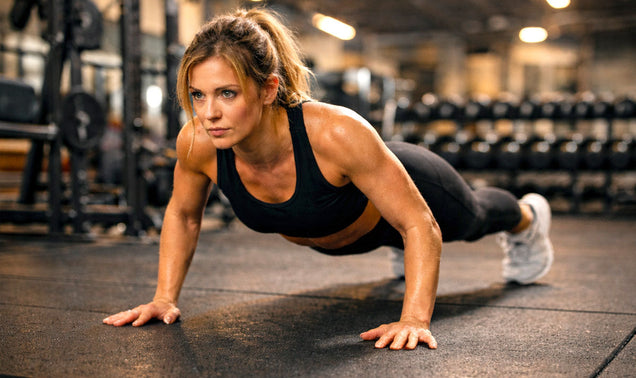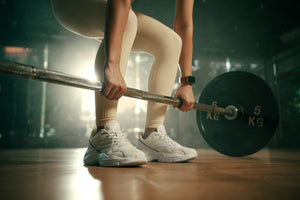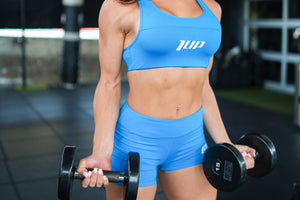So often, we’re told that in order to lose weight, we need to “eat less, move more.”
And, it makes sense that when you’re dieting, you’ll experience some hunger pangs (since you’re consuming fewer calories than your body needs to maintain its weight).
But, where many individuals find frustrating is that the “move more” component of fat loss actually compounds their feelings of hunger and makes dieting that much more laborious.
Today, we discuss why it seems exercise may make some individuals feel hungrier, while others don’t seem to be as affected by it.
Does Exercise Make Me Hungry?
After a hard workout, we’ve all had the thought at one time or another or “I’m so hungry I could eat a …”
And, when you step back and think about it, it makes perfect sense why you’d be hungry after training.
Exercise:
- Burns calories
- Depletes glycogen stores
- Stimulates appetite by altering hunger and satiety hormones
- Dehydrates
Now, the duration and intensity of exercise also factor into whether or not you feel hungry afterward.
For instance, simply going on a 10-minute walk around the block isn’t really going to rev up your appetite quite the same way as a 3-hour hike in the mountains will.
Research shows that both resistance training and steady-state cardio (in the form of a 60-minute run) lead to a short-term (1 to 2 hour) suppression of appetite, as evidenced by a reduction in ghrelin (the hormone that stimulates appetite).[1]
This same study also noted an increase in peptide YY (a gut hormone that reduces appetite).[1]
Another study found that higher intensity cardio sessions for shorter durations (36 minutes at 75% maximum heart rate) had a greater impact on ghrelin levels in the body compared to running for longer periods at a lower intensity (55 minutes at 50% maximum heart rate).[2]
Finally, a 2014 meta-analysis investigating exercise’s effect on appetite concluded:
“An acute bout of exercise may influence appetite by suppressing levels of acylated ghrelin while simultaneously increasing levels of PYY, GLP-1, and PP, which may contribute to alterations in food and drink intake after acute exercise.”[3]
Acute bouts of exercise may have a transient (short lived) suppression of appetite. The extent to which your appetite is suppressed depends on a combination of exercise intensity, duration, and the temperature in which you train.
The hotter the environment is, the longer it will take you to cool off after training and regain your hunger.
Interestingly, some research indicates that the hunger-suppressing effects of exercise do not affect overweight/obese women the same way it does to lean women.[4]
The reason for this is that obesity interferes with leptin signaling in the body, which impacts how the body senses exercise energy expenditure and the subsequent suppression of appetite.
So, where does this leave us?
Well, it depends on your goals.
For Weight Loss
If you're focused on losing weight, you can use short bouts of physical activity to help keep hunger in check. Doing some sort of physical activity (even something as simple as a 10-minute walk) can help take your mind off of food and make it easier to stick to your diet plan.
We all know that boredom is one of the main reasons people eat, so why not do some light movement to help occupy your mind and keep your hands out of the cookie jar
For Gaining Strength and Building Muscle
While you might not be hungry after a heavy resistance training session, it’s important to refuel your body. Now is not the time to be depriving yourself of the necessary protein and carbohydrates your body needs to refuel, repair, and grow.
Even if you’re not hungry for a full 3-course meal, you can simply mix up a shake consisting of whey protein which is light on the stomach and easy to digest, yet packed with protein.
For added recovery, you can also throw in a scoop of Tri-Carb, our easy to mix carbohydrate matrix to enhance glycogen replenishment and muscle repair.
References
- Broom, D. R., Batterham, R. L., King, J. A., & Stensel, D. J. (2009). Influence of resistance and aerobic exercise on hunger, circulating levels of acylated ghrelin, and peptide YY in healthy males. American Journal of Physiology-Regulatory, Integrative and Comparative Physiology, 296(1), R29–R35. https://doi.org/10.1152/ajpregu.90706.2008
- Broom DR, Miyashita M, Wasse LK, et al. Acute effect of exercise intensity and duration on acylated ghrelin and hunger in men. J Endocrinol. 2017;232(3):411-422. doi:10.1530/JOE-16-0561
- Schubert MM, Sabapathy S, Leveritt M, Desbrow B. Acute exercise and hormones related to appetite regulation: a meta-analysis. Sports Med. 2014;44(3):387-403. doi:10.1007/s40279-013-0120-3
- The Endocrine Society. "Exercise Reduces Hunger In Lean Women But Not Obese Women." ScienceDaily. ScienceDaily, 19 June 2008.





